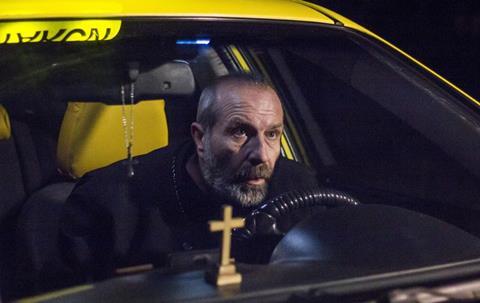A bleak insight into modern-day Bulgaria.

Dir. Stephan Komandarev. Bulgaria/Germany/Macedonia, 2017. 103 mins.
Stefan Komandarev’s new film, which focuses on several Sofia cab drivers and the challenges they encounter in the course of one night, could be best described as a bleak inventory of dysfunctions in today’s Bulgaria. This collection of discouraging episodes, loosely linked by the aftermath of the opening sequence, takes the desolate image of life in Bulgaria presented in recent films such as The Lesson and Godless a step further, covering more ground and leaving less hope for a better future. Festivals will consider it a relevant addition to their programs, although its downbeat approach may make it too fierce to cross over into the open market.
The limited space of the taxi, which already dictates claustrophobic nature of every scene, is further enhanced by the decision to use no more than one shot per episode
The mood and the thrust of Directions (Posoki) are established from the very beginning when Micho (Vasil Vasilev-Zueka), a small-time businessman who drives a taxi to pay the bills but hopes to get a loan for his failing workshop, loses control and shoots the corrupt banker who has denied him help. He then commits suicide.
Other cabbies, many of them also under-paid white-collar professionals, are shown rushing through the city’s busy traffic, all their radios tuned to a station which is running a commentary about Micho’s desperate act. Many callers justify it as yet another sign of the exasperation taking hold of the entire country. This broadcast runs throughout the film, providing the backbone which holds it together.
As for the people who ride in the taxis, their brief exchanges with the drivers convey the mood, the morals and the social conditions prevalent in today’s Bulgaria. This includes a surgeon leaving a country he can no longer live in; a sleazy businessman coming back to the country he had left to clinch some deal; and a trio of drunken students on the make who couldn’t care less about the driver who has recently lost his only son. A lecherous man and his giggling girlfriend hop in the cab on their way to spend the night in a discreet hotel, followed by a teacher who is about to commit suicide after his students ridiculed him on Facebook. Finally, an unemployed baker who is about to have a heart transplant calls a taxi to drive him to the hospital and on the way argues with the driver, an Orthodox priest, about how God has forsaken this country once and for all.
The episodes are replete with such remarks as: “Bulgaria is a country of optimists because all the realists and pessimists have left it long ago.” The suggestion is that the only people who are still there are the ones who couldn’t manage to find a decent refuge to flee to.
Komandarev, whose previous film, The World Is Big And Salvation Lurks Around The Corner displayed the kind of Mediterranean joie de vivre which raised a smile even in the dark, is too engrossed in his characters’ troubles to let the sun shine in here. The limited space of the taxi, which already dictates claustrophobic nature of every scene, is further enhanced by the decision to use no more than one shot per episode
The brevity of each sketch allows both characters and script only quick, superficial, though no doubt pertinent observations and ultimately, this is more of a catalogue of everything that went wrong in Komandarev’s homeland rather than an analysis. Maybe, because - as he claims - you first have to see it all before you can eal with it.
Production companies: Argo Films, Artis Film Production, Sektor Film.
International Sales: Arri Media (MHemminger@arri.de)
Producers: Katia Trichkova, Vera Weit, Angela Nesterovska
Screenplay: Stephan Komandarev, Simeon Ventsislavov
Cinematography: Vesselin Hristov
Editing: Nina Altaparmakova
Production design: Marsia Koycheva
Cast: Vasil Vasilev-Zueka, Ivan Barnev, Assen Blatechki, Irini Zhambonas, Vasil Banov, Troyan Gogov, Dobrin Gosev, Guerassim Guerguiev, Dimitar Banenkin, Stephan Denolyubov







![The Brightest SunScreen[Courtesy HKIFF]](https://d1nslcd7m2225b.cloudfront.net/Pictures/274x183/3/5/0/1448350_thebrightestsunscreencourtesyhkiff_312678.jpg)














![The Brightest SunScreen[Courtesy HKIFF]](https://d1nslcd7m2225b.cloudfront.net/Pictures/100x67/3/5/0/1448350_thebrightestsunscreencourtesyhkiff_312678.jpg)

